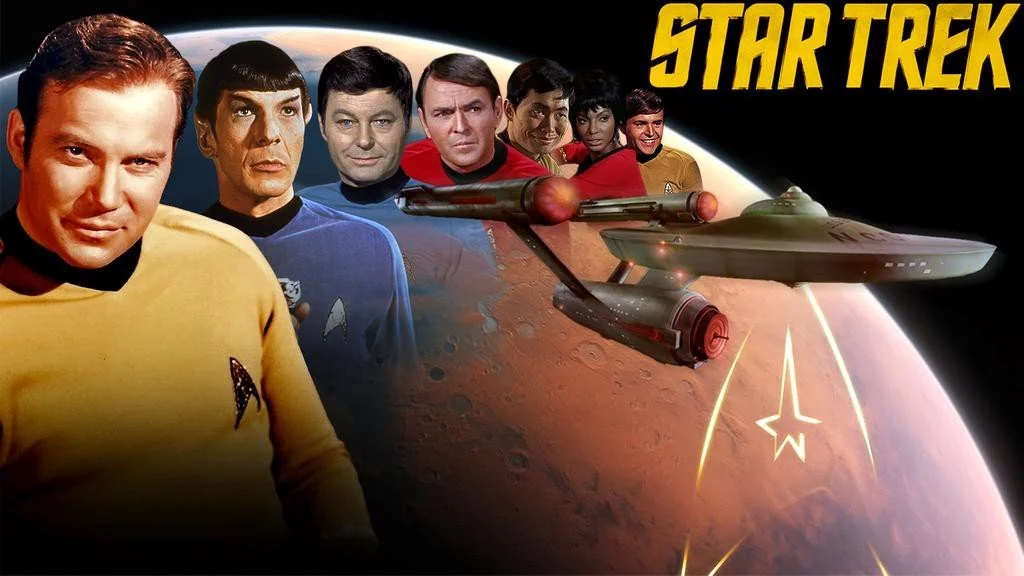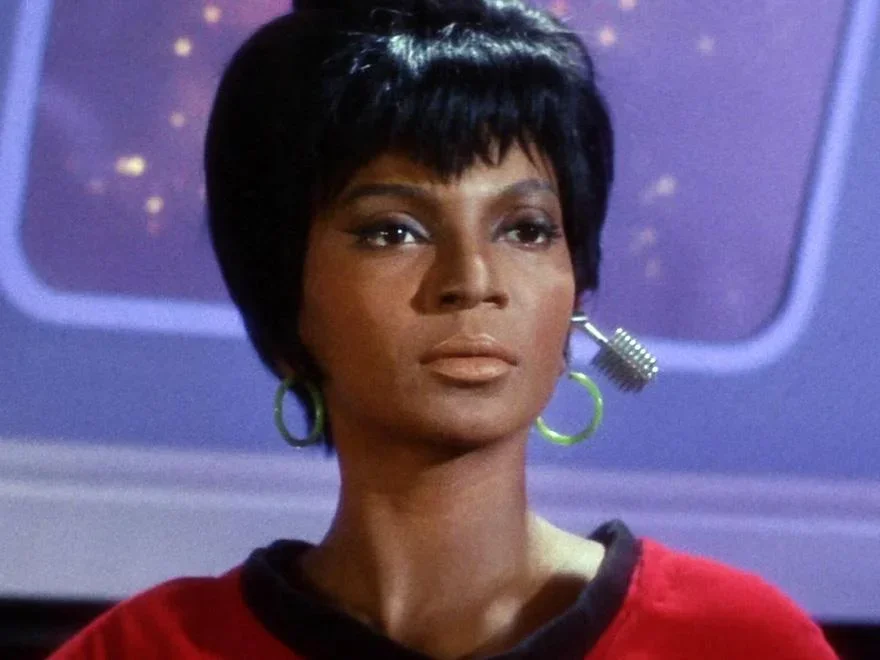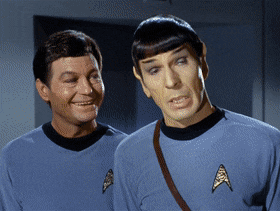Where No Man Has Gone Before
(Originally written August 8, 2022)
I've been meaning to write this post since... well, since whenever my last post was. But Nichelle Nichols's passing was something of an inspiration to finally tackle this one.
There have undoubtedly already been countless commentaries about Star Trek–its history, its strengths, its weaknesses, its cultural impact, and so on and so on. There’s not much I can say about it that hasn’t already been said, so I want to focus more on my own experience.
I was never much into sci-fi growing up. Or maybe more accurately, I wasn’t exposed to it much so I assumed I wasn’t much into it. Then at some point as a teenager I read Ender’s Game for the first time and realized that there was so much more to sci-fi than I had ever imagined.
(On a side note, I’m aware that Orson Scott Card, who wrote Ender’s Game, is apparently a dreadful person, but I still love the book and it was pretty influential for me as a teenager, so it holds a special place for me.)
I’d never considered that sci-fi was more than just weird aliens or cheesy robots or cosplay nerds at conventions. Sci-fi is a way to approach real issues, real questions, real emotions, through a different lens. It’s taking what exists and thinking beyond it, peering into what could be. Maybe that all seems obvious, but to me it was kind of a revelation. It’s so much more than what it’s often given credit for. Certainly more than I had ever given it credit for.
Fast forward a few years and I decided to finally check out Star Trek, see what the fuss was all about. I’m a bit of a stickler for chronology, so I felt the need to start with the Original Series (or TOS, in Trek lingo).
I loved it.
It’s campy, it’s over the top, and it’s so intensely 1960s it almost seems like a parody. But I totally get why it took off. The stories are fun, and the world it envisioned was something aspirational. Especially at a time in history like the Cold War when there was so much fear and uncertainty, I can see why people would want to imagine a world where not just an entire planet, but entire galaxies can commit themselves to peace and cooperation. And, planting itself firmly in the middle of the Space Race, Star Trek celebrates human curiosity in its purest form.
It broke ground in all kinds of ways, in terms of content and in terms of technical achievement. I’m obviously a pretty huge TV history nerd, so it’s hard for me to overlook what Star Trek did for television in general. It’s part of why I ultimately like it so much. It certainly wasn’t the first sci-fi series on television, but it was among the first to make pure sci-fi into entertainment for grown-ups. Star Trek was smart sci-fi, showing the world at large what the genre can really do.
I really appreciate entertainment that respects its audiences and trusts them to understand it without hitting them over the head. Some episodes were pretty heavy-handed (the season 3 episode “Let That Be Your Last Battlefield” comes to mind, an episode that way oversimplifies race issues with black-and-white-faced aliens facing off against white-and-black-faced aliens), but TOS took a lot of opportunities to address real world issues with complexity and intelligence.
While TOS isn’t really as character-driven as the later Star Trek series, that’s not to say that the characters didn’t matter. It’s lovely to see a group of people who are passionate about what they do. Scotty loves the Enterprise more than anything else in the world--uh, universe, I guess. Bones, though he may be a grouch about most things, does ultimately have a real interest in applying his knowledge to new situations. Chekov’s youth and enthusiasm shine through on a mission that’s all about curiosity. Plus the fact that he is Russian was pretty significant considering this was smack in the middle of the Cold War. And Captain Kirk is passionate about exploration and innovation. And women.
Spock is also something really special all on his own. I think everyone has moments when they just aren’t sure where they belong in the world, and Spock is a really poignant way of showing that struggle on the screen. Half Vulcan, half human, Spock is always at odds with which part of himself he should embrace. Leonard Nimoy gave the character such care, depth, and humanity (alien-ity?), despite being generally pretty non-expressive.
On another note, I am a little disappointed that newer versions of the series “remastered” the special effects to make them more modern, because what Star Trek achieved in the 1960s, especially for a network TV show, was pretty incredible. It took me out of the world a little bit to see modern CGI on the USS Enterprise. But that may just be the TV nerd in me. A lot of people like it, I guess.
To be fair, TOS is far from perfect. There are plenty of really weird episodes, especially in the last season. Like the one where the cult members spend two-thirds of the episode singing songs with Spock ("The Way to Eden"). I genuinely like the premise of that one, but it was excruciatingly obvious that they needed to pad the runtime. And, like, Spock joining a sing-along with space hippies? Spock may have been a musician, but the whole thing was pretty out of character.
But the unfortunate way it approaches women is particularly notable considering how forward-thinking it was in terms of its vision of society. It's one of the most obvious ways in which it's definitely a product of its time.
It’s odd, seeing Lieutenant Uhura so prominent as a Black woman with a crucial role on the Enterprise bridge, and yet most other women in the series are mostly portrayed as frivolous, in need of rescue, overly sexualized, or basically irrelevant. Uhura doesn't even get much to do as a character. Her presence shouldn't be diminished, because it was hugely important, but she doesn't have much to say, doesn't have much input, and frankly doesn't have much of a character.
Nichelle Nichols was beautiful, talented, and made such a huge impact on the world. It's just a shame that she didn't get more opportunity to make Uhura a well-rounded character.
I mean…
Besides Uhura and Nurse Chapel (played by Gene Roddenberry's wife Majel Barrett), pretty much any woman aboard the Enterprise is a "yeoman," which is spaceship-speak for "glorified secretary." Kirk specifically complains in one of the early episodes about his yeoman being a woman, so apparently sexism isn't dead in the 23rd century. Barrett was even supposed to play the Enterprise's first officer, but following the failed first pilot episode "The Cage," she was more or less demoted to the ship's nurse, whose main character trait is having a crush on Spock.
For the most part, the women in the series exist to be rescued and/or seduced by the dashing Captain Kirk or other male characters. They are generally portrayed as emotional and weak, if they have anything to do at all. It's honestly frustrating to watch, because in most other aspects Star Trek went so far out of its way to break barriers. It brings an elevated vision of the future crashing back down to Earth. Despite the fact that women were more or less responsible for the enduring Star Trek fandom, seemingly little thought was given to women in the series at all.
That's not even mentioning one of the worst episodes of the series, the season 3 episode "The Turnabout Intruder." In that one, Captain Kirk's body is taken over by mad scientist and former lover Dr. Janice Lester, who wants to take over the Enterprise but can't because her vindictive, hysterical woman-ness gets in the way. It was the last episode of the series, too. Not a great way to go out.
(The Next Generation has the same problem in a lot of ways, too.)
For better or worse, Star Trek didn't quite reach the "five year mission" it boasted in its opening monologue. It got shuffled around in the network lineup so much that it didn’t stand much chance of making it much longer than the three seasons it was given, especially considering how awful a lot of the season three episodes are. It did just eke out enough episodes to make it to syndication, which was a major contribution to its enduring legacy. Its cancellation also ultimately led to tons of movies, as well as the animated series, followed by an ever-growing number of spin-offs and continuations. Would Star Trek have had the same enduring cultural impact if it hadn’t been canceled when it was? Hard to say.
Regardless, it made an impact on me. I only wish I had given it a chance a long time ago, because Star Trek has opened my mind to a whole new genre of stories. Ultimately I’m more of a Next Generation gal (although I'm still working my way through the franchise), but I owe it to TOS that I finally ventured out of my snobbery and into the truly wonderful, fun, thoughtful, entertaining universe that is Star Trek.
Am I glad I watched Star Trek?
My Favorite Episode: It's been a while since my full watch-through, but two come to mind: "Who Mourns for Adonais?" (Season 2, Episode 2) and the classic "The Trouble with Tribbles" (Season 2, Episode 15)
In "Who Mourns for Adonais?" the Enterprise is literally grabbed out of the air by a powerful entity that may or may not be the Greek god Apollo. Apollo refuses to let the crew leave and demands that they give up their modern ways to serve and worship him. He says that he is the only remaining god, the others having withered away because the humans stopped caring about them. Greek mythology is my jam, and I like the idea of the Greek gods being entities who require the servitude of lesser beings in order to exist. They were super petty in the myths, after all. It doesn't seem out of character for them.
"The Trouble with Tribbles" is probably one of the best-known episodes, featuring a cast of hundreds of pom-poms playing Tribbles, cute little furry creatures that breed like nobody's business. The Enterprise is tasked with protecting a shipment of grain from Klingons who would like to take over the planet where the grain is headed. The Klingons, Federation politics, and the impossible population of Tribbles wreak havoc everywhere. This is probably one of the goofiest episodes, and it genuinely feels like everyone was having fun with it. Plus, seeing Spock gently pet a pom-pom is priceless.
Stay Tuned for Our Next Episode:
Frasier, Revisited
Previously on Of Sight, Sound, and Mind:
Monk









